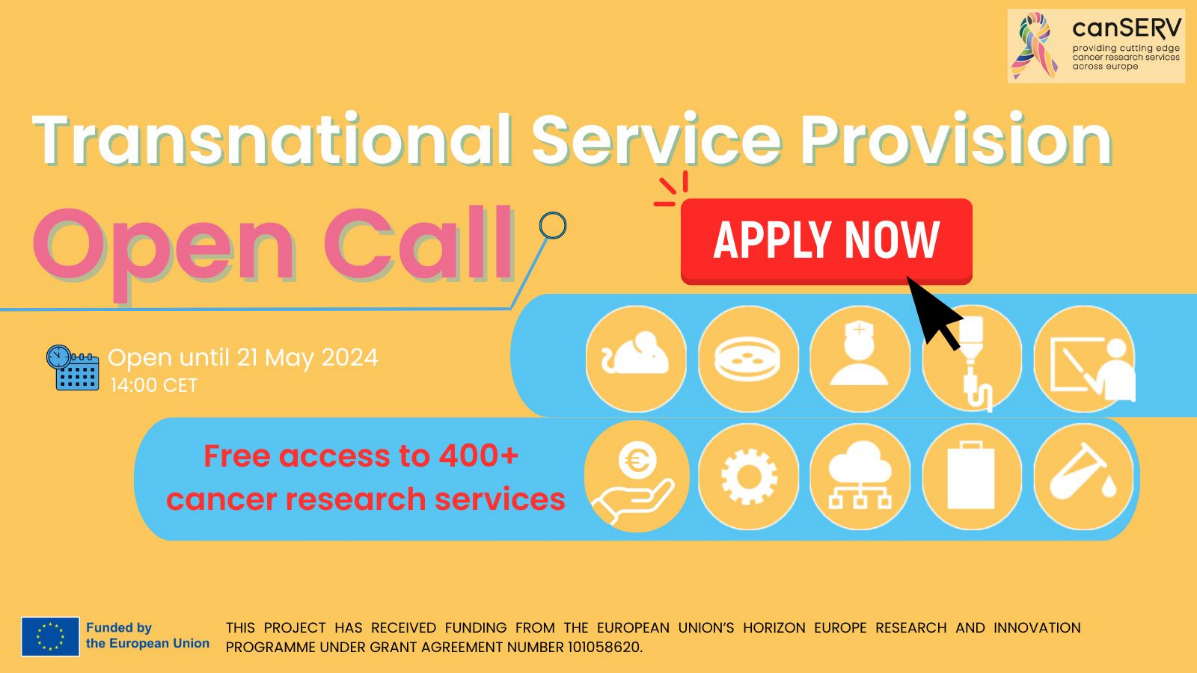
Deadline: 21 mai 2024
https://www.canserv.eu/calls/open-call-for-transnational-service-provision/
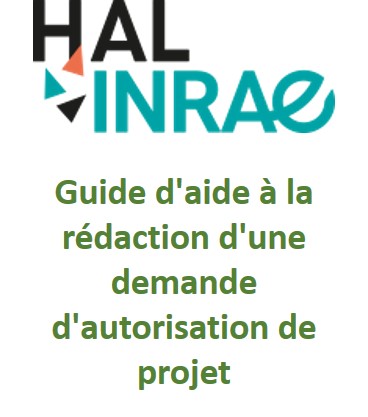
Guide rédaction DAP
La vocation de ce guide est d'aider les concepteurs dans la rédaction d’une demande d’autorisation de projet impliquant l'utilisation d'animaux vivants à des fins scientifiques. Il a été conçu par le groupe de travail « Éthique et Bien-Être Animal » de CELPHEDIA sur la base de la version 1.2.0 de l'application APAFiS-EU.

19 janvier 2023 - 31 décembre 2023
https://savoirs.unistra.fr/eclairage/institut-clinique-de-la-souris-des-rongeurs-et-des-hommes

11 février 2022
https://www.gircor.fr/transparence-cedric-villani-visite-deux-animaleries-de-recherche-a-strasbourg/
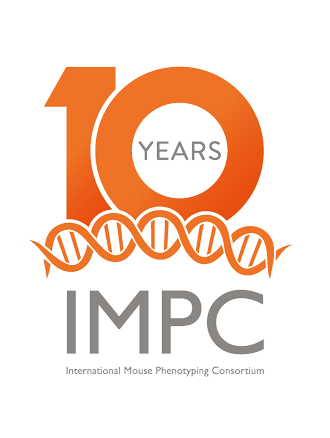
23 septembre 2021 - 24 septembre 2021
https://www.mousephenotype.org/about-impc/impc-10-year-anniversary/
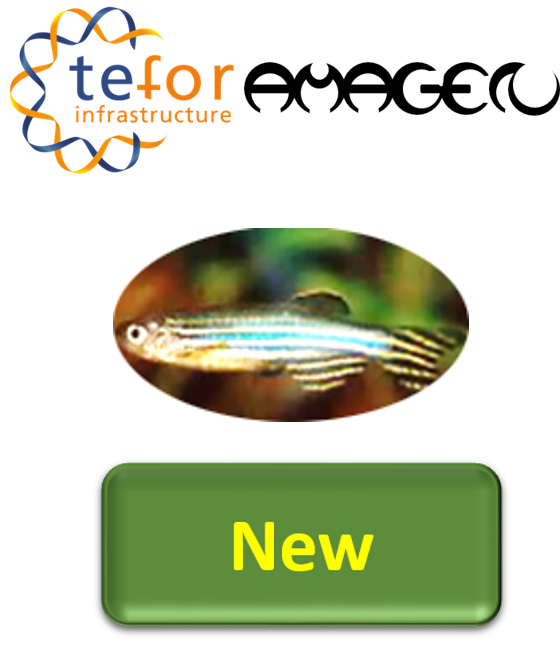
Stage en immersion dans un centre travaillant sur les modèles poisson-zèbre & medaka: Gestion d'une animalerie aquatique - Injection et transgénèse
Stage en immersion en laboratoire pour un seul stagiaire

Regulatory training designed for Anglophone students and researchers having a direct scientific responsibility for experimentation on animals.
The training program of 57 hours (over 7 days) is designed for Anglophone students and researchers having a direct scientific responsibility for experimentation on animals.
The teaching will focus on regulatory and legislative initiatives in animal experimentation in accordance with European and national regulation. It will also provide basic knowledge on the handling and use of laboratory rodents (animal welfare, ethics, cognition and behaviour, pain and stress, anaesthesia, analgesia, euthanasia, pathologies, zootechnics, anatomy, physiology, genetic engineering, phenotyping, imaging, alternative methods, biostatistics), as well as the selection criterion of an animal model.
This regulatory training is organized by CE2F-PRIM and held with the collaboration and the assistance of all the partner centers of CELPHEDIA. It will take place on July 3-11, 2017, in Marseille and might be limited to non-Francophone students and researchers working in a CNRS unit.
To register, create an account on the link Registration
3 juillet 2017 - 11 juillet 2017
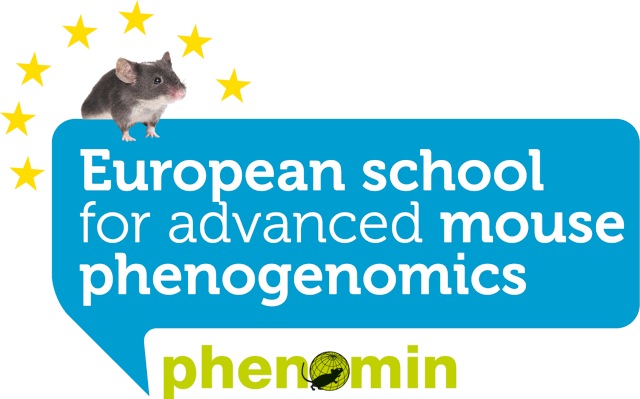
International training focused on best practices in the use of the mouse model for biomedical research
Good practices: use of mouse models for biomedical and scientific research
Would you like to learn how to choose, create and analyze your best mouse model? Do you have a sufficient background in mouse functional genomics to lead at best your research?
This international training of excellence provides engineers, PhDs and researchers with an innovative program focused on best practices in the use of the mouse model biomedical and scientific research. Reach us and you will gain crucial skills required to use as best mutant mice and support you in your research!
It provides a wealth of information on good practices in the use of mouse model (standardized techniques, ethics, regulations, analysis, data and resources ...) to support attendees in their research.
The training takes place in Goersdorf-Liebfrauenberg (North of Alsace, France) from June 12 th to 16th.
12 juin 2017 - 16 juin 2017
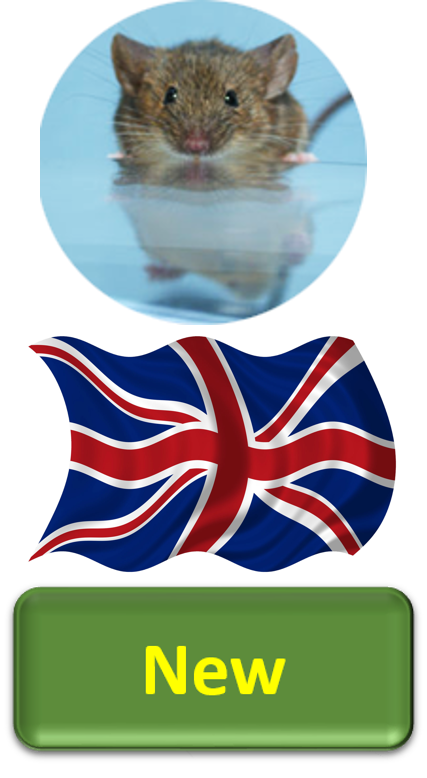
Formation en ANGLAIS: vision générale des connaissances fondamentales et du savoir-faire en phénotypage
La formation, dispensée en anglais et est ouverte aux doctorants, post-doctorants, chercheurs et ingénieurs.
Alternant cours théoriques et ateliers pratiques, cette formation a pour objectif de proposer une vision générale des connaissances fondamentales et du savoir-faire en phénotypage, afin de répondre à la question : Quel est le problème chez ma souris ?
① Comprendre l'intérêt du phénotypage pour caractériser les fonctions des gènes dans les modèles souris
② Découvrir les considérations scientifiques et éthiques indispensables en phénotypage
③ S'informer sur les ressources du Web actuellement disponibles
④ Interagir et discuter avec les experts sur votre propre sujet scientifique
Les stagiaires devront avoir des connaissances de base de la physiologie de la souris ainsi que des capacités à manipuler les souris.
Formation "CNRS formation entreprises" à Illkirch (périphérie de Strasbourg)
14 mars 2017 - 17 mars 2017
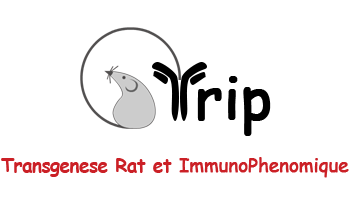
The "Transgenic Rat" meeting will update information on techniques and models in transgenesis and genetic engineering.
This meeting is organized by the “Transgenic rats” core facility, SFR François Bonamy, Biogenouest, TEFOR and IBiSA. The quality of the speakers is of the highest international level. The meeting will give the opportunity to update information on techniques and models in transgenesis and genetic engineering. It is intended for Master, PhD and medical students with a background in molecular biology and genetics as an introduction to future work in these rapidly developing areas of research. It is also intended for post-docs and scientists already working in certain of these fields and who are interested in expanding their knowledge on the potential applications of these new techniques to their models or in neighbouring pathophysiological models of analysis of genes or diseases using genetically modified animals.
11 mai 2017 - 12 mai 2017

Lancement du 3ème appel à projet "Modèles murins & Maladies Rares" par la Fondation Maladies Rares et PHENOMIN
La Fondation maladies rares et l’infrastructure nationale PHENOMIN ont le plaisir de vous annoncer le lancement du 3ème appel à projets de recherche ‘Modèles murins et Maladies Rares’.
L’objectif de cet appel à projets est de donner une impulsion significative à la création et à l’étude de modèles murins de maladies rares, dans le but
- d’élucider les mécanismes physiopathologiques sous-jacents
- de développer de nouvelles stratégies thérapeutiques.
Cet appel à projets vise à créer et caractériser des modèles murins– Knock-Out constitutifs (KO) - conditionnels (cKO), Knock-In (KI) et transgéniques(TG), dans le champ des maladies rares.
Télécharger l’appel à projets
La demande s’effectue en ligne
La date limite de soumission des projets est fixée au *jeudi 9 février 2017, 17h*.
9 février 2017
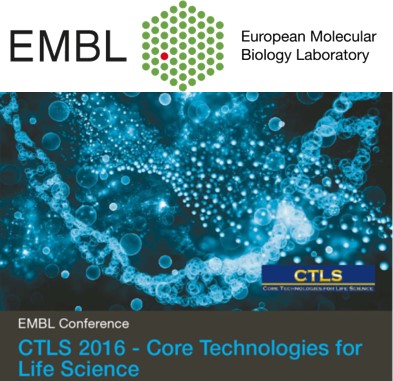
CTLS 2016 gathers scientists, decision makers and opinion leaders, involved in Core Technology Facilities of Life Science.
CTLS 2016, organized by EMBL, aims to bring together not only scientists, technicians and managers, but also decision makers and opinion leaders involved in Core Technology facilities and resource laboratories in all fields of Life Science.
Building on the success of CTLS 2014 in Paris, this meeting will be a unique opportunity to listen and discuss with colleagues and peers about challenges and solutions on all scientific, technological, managerial funding, educational and community building aspects of core facilities and infrastructures.
Keynote lectures will provide the big picture of this dynamic field, complimented by five plenary sessions comprising both oral and poster presentations, which will allow presenters and attendees to explore and discuss issues concerning European core facilities and infrastructures. There will also be ample opportunity for existing and prospective core facility networks or interest groups to organise satellite meetings.
Topics: transversal issues concerning, Core Facilities in Life Sciences (CFLS)
CTLS meeting will be held in EMBL Heidelberg, Germany on June 12-15, 2016
Detailed description & registration
12 juin 2016 - 15 juin 2016
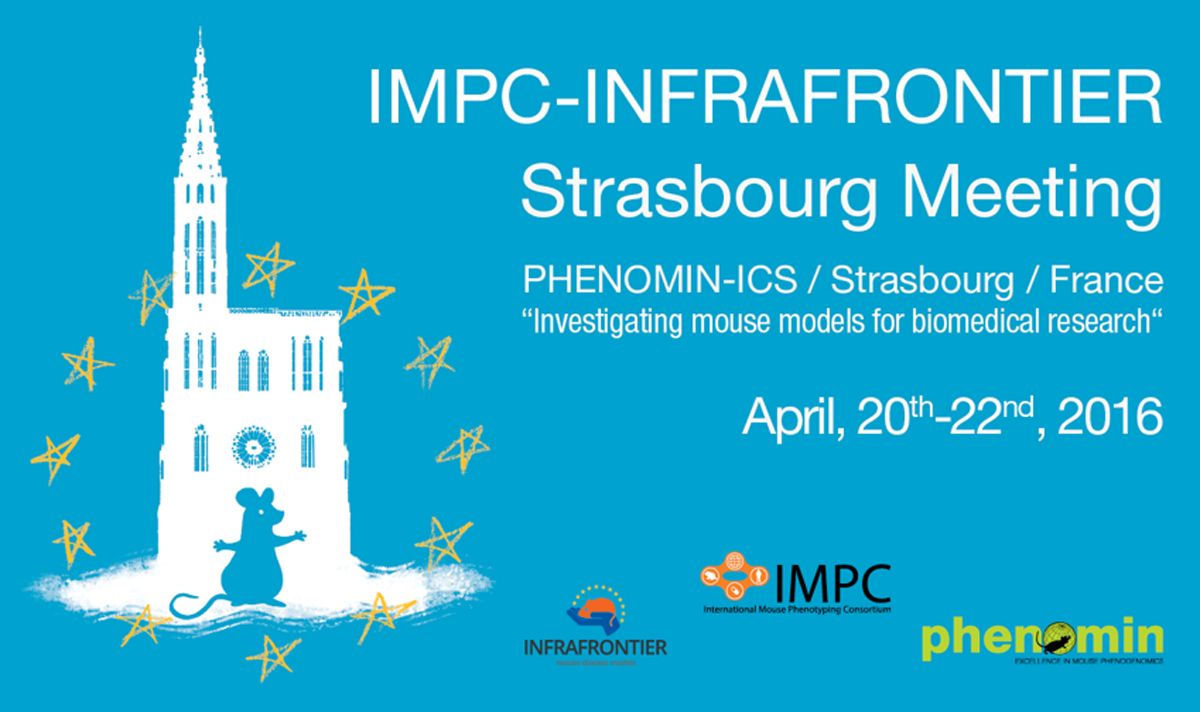
Investigating mouse models for biological for research
The congress aims to promote the International Mouse Phenotyping Consortium (IMPC) mouse lines, importance of mouse phenotyping & clinical and drug discovery collaboration, to present progresses performed by IMPC with regards CRISPR editing genome, rare diseases, microbiota and ageing pipeline, as well as illustration of examples of scientific projects about “Animal models for human diseases” and recent developments in mouse models phenotyping imaging.
We count on the attendance of 200 total participants every day including researchers of regional, national, European and international prominence and IMPC members and funders. The IMPC congress will be held on April 20-22, 2016 in Illkirch, France.
Description of the meeting
Detailled program
20 avril 2016 - 22 avril 2016
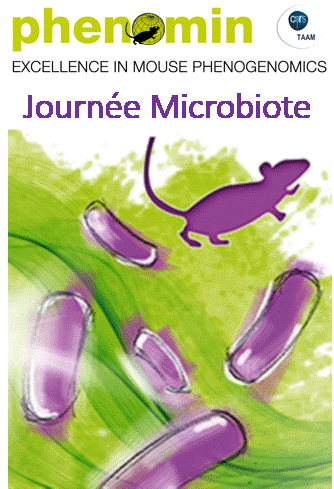
Au cours de cette journée, des experts parcoureront l’état de la science en matière d’études sur le microbiote et de ses interactions avec l’hôte.
Une journée « Microbiote et modèle animal » est organisée par l’infrastructure Nationale PHENOMIN, le 16 mars 2016 sur le Campus CNRS d’Orléans.
Il est aujourd’hui prouvé que le microbiote a un impact important sur le développement et la santé humaine. Les méthodes d’études de ces populations bactériennes et de leurs interactions avec les cellules de l’hôte sont en plein développement. Pour certaines, elles utilisent des modèles animaux permettant par exemple de comparer l’impact de flores contrôlées différentes sur le phénotype ou de mesurer cet impact en fonction du génotype d’animaux modifiés.
Le but de cette journée est de parcourir, grâce aux exposés d’experts, l’état de la science en matière d’études sur le microbiote et de ses interactions avec l’hôte mais également de visiter une animalerie de rongeurs forte d’une expérience de plus de 10ans sur le maintien d’animaux génétiquement modifiés à flore contrôlée.
Programme & Inscription
15 mars 2016
http://www.celphedia.eu/site-media/docs/carton_invitation_TAAM_microbiote-12-01-2016.pdf
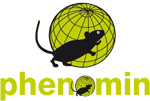
The National Infrastructure PHENOMIN is pleased to announce the results of its 6th Call: Generation and Characterization of CreERT2 cell specific promoter driven deleter mouse lines.
The National Infrastructure PHENOMIN is pleased to announce the results of its 6th Call: Generation and Characterization of CreERT2 cell specific promoter driven deleter mouse lines. The Scientific Committee has selected 13 projects amongst 34 submitted projects from 20 PI. Consequently, 9 additional CreERT2 mouse lines will be generated by PHENOMIN team and will be made available as soon as possible for the scientific community. 4 CreERT2 mouse models been already generated by the European EUCOMMTOOLS consortium, will be further characterized.
You will find the details of the selected models on: http://www.phenomin.fr/calls/current-call/#phenomin-6th-call-results
To get more information, contact mutagenesis@igbmc.fr
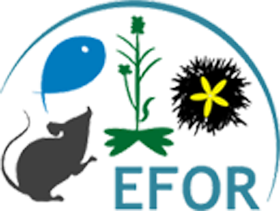
Comme chaque année, le congrès du réseau EFOR sera dédié aux divers modèles animaux utilisés en recherche scientifique.
Le réseau EFOR a la joie de vous annoncer son 7ème meeting annuel qui se tiendra à Paris les 7 et 8 Mars 2016.
Les sessions thématiques se dérouleront le 1er jour (7 Mars): Modèles pour l'étude des cellules souches de divers tissus. Modèles pour l'étude d'accidents cérébrovasculaires. Nouvelles technologies en imagerie et outils de traitement de données. Edition du génome chez les animaux: questions éthiques.
Le 2nd jour sera consacré à des ateliers qui évolueront en parallèle, chacun étant dédié à un animal modèle ou une classe d'animaux modèles: poisson-zèbre, nématodes, primates non humains, oiseaux, lépidoptères, métazoaires marins, arthropodes, drosophile.
Programme préliminaire
Pour s'enregistrer, merci de contacter djian@inaf.cnrs-gif.fr
7 mars 2016 - 8 mars 2016
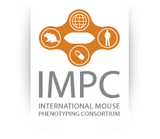
Benefits and challenges of applying the guidelines for the IMPC
The Animal Research Reporting of In Vivo Experiments (ARRIVE) guidelines were developed to address the lack of reproducibility in biomedical animal studies and improve the communication of research findings. While intended to guide the preparation of peer-reviewed manuscripts, the principles of transparent reporting are also fundamental for in vivo databases. Here, we describe the benefits and challenges of applying the guidelines for the International Mouse Phenotyping Consortium (IMPC), whose goal is to produce and phenotype 20,000 knockout mouse strains in a reproducible manner across ten research centres. In addition to ensuring the transparency and reproducibility of the IMPC, the solutions to the challenges of applying the ARRIVE guidelines in the context of IMPC will provide a resource to help guide similar initiatives in the future.
More information on PLOS biology
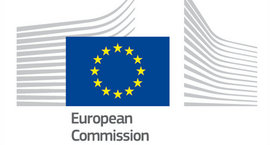
Publication de la communication
La Commission Européenne a publié une communication concernant l'Initiative Citoyenne Européenne “Stop Vivisection” qui visait à abroger la Directive Européenne actuelle 2010/63/EU (voir les news publiées précédemment).
En bref, cette initiative a été rejetée par la CE et aucun changement ne sera appliqué à la législation actuelle.
En fait, malgré que la CE reconnaisse les préoccupations exprimées par les partisans de cette initiative, la directive a été confirmé comme étant le meilleur compromis entre l'amélioration du bien-être animal et la recherches biomédicale nécessitant des expérimentations animales.
Pour plus d'informations, veuillez consulter le texte de la communication de la CE: http://ec.europa.eu/environment/chemicals/lab_animals/pdf/vivisection/en.pdf
http://ec.europa.eu/environment/chemicals/lab_animals/pdf/vivisection/en.pdf

A meeting to update information on techniques and models in transgenesis and genetic engineering.
This meeting is organized by the “Transgenic rats” core facility, SFR François Bonamy, Biogenouest, TEFOR and IBiSA. The quality of the speakers is of the highest international level. The meeting will give the opportunity to update information on techniques and models in transgenesis and genetic engineering.It is intended for Master, PhD and medical students with a background in molecular biology and genetics as an introduction to future work in these rapidly developing areas of research. It is also intended for post-docs and scientists already working in certain of these fields and who are interested in expanding their knowledge on the potential applications of these new techniques to their models or in neighbouring pathophysiological models of analysis of genes or diseases using genetically modified animals.
2 juillet 2015 - 3 juillet 2015
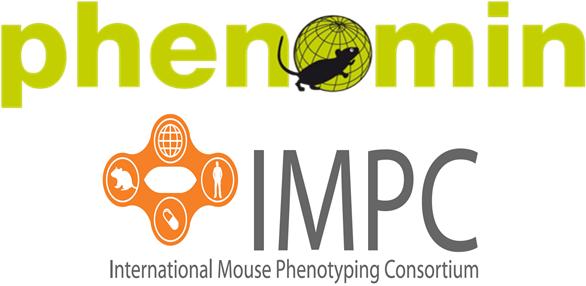
PHENOMIN is launching the 3rd Call for nomination in the frame of its partnership with IMPC
The National Infrastructure PHENOMIN PHENOMIN (CIPHE, ICS, TAAM) is pleased to announce the launch of the 3rd call for nomination in the frame of its partnership with the International Mouse Phenotyping Consortium (IMPC). This call for proposals is addressed to French-based research groups. It aims to establish and characterize mouse models: constitutive Knock-out (KO) and conditional Knock-Out (cKO). These knockout mice, together with the wealth of associated data, will serve as a valuable, freely available, resource for French researchers investigating gene function and human pathophysiology.
Since 2011, PHENOMIN has generated more than 150 models. In the frame of the IMPC more than 5,000 genes are already committed to the IMPC pipeline. Until the end of 2016, PHENOMIN will generate 100 additional knock-out lines. All these lines will be phenotyped through the standardized IMPC broad-based pipeline. Up to now, all models have been generated from ES mutant cells with conditional potential generated by the International Knockout Mouse Consortium (IKMC).
In the frame of this call, we have added constitutive knock-out models to be generated using CRISPR (clustered regularly interspaced short palindromic repeats) genome editing technology.
Conditions for eligibility:
For all models that will be selected, please consider that:
To apply to this call for proposal, please fill in the application form.
Extended application deadline: June 15th, 2015.
Deadline: 15 juin 2015
http://www.phenomin.fr/calls/current-call/#phenomin-5th-call-for-proposals
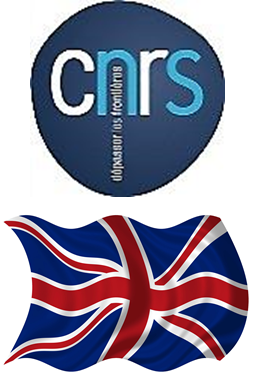
Regulatory training in English for staff developing experimental procedures and projects
Regulatory training in ENGLISH for staff developing experimental procedures and projects (former level I)
The training program of 57 hours (over 7 days) is designed for Anglophone students and researchers having a direct scientific responsibility for experimentation on animals.
The teaching will focus on regulatory and legislative initiatives in animal experimentation in accordance with European and national regulation. It will also provide basic knowledge on the handling and use of laboratory rodents (animal welfare, ethics, cognition and behaviour, pain and stress, anaesthesia, analgesia, euthanasia, pathologies, zootechnics, anatomy, physiology, genetic engineering, phenotyping, imaging, alternative methods, biostatistics), as well as the selection criterion of an animal model.
This regulatory training is organized by CE2F-PRIM and held with the collaboration and the assistance of all the partner centers of CELPHEDIA. It will take place from September 7th-15th 2015, in Marseille and might be limited to non-Francophone students and researchers working in a CNRS unit.
To register, create an account on https://formations.primato.cnrs.fr/createAccount.php
Send all enquiries to formation-experimentation@ipbs.fr
7 septembre 2015 - 15 septembre 2015

Research projects supported by the Scientific Committee
The "Fondation maladies rares", in partnership with the national infrastructure PHENOMIN, supports research projects dedicated to the development and to the study of murins models in the field of the rare diseases.
This joint call for projects "Mouse models and rare diseases" aims to give a significant boost to the development of mouse models, in order to :
gain a better understanding of the pathophysiological mechanisms involved in rare diseases whose defective genes have been identified
test and validate therapeutic proofs of concept, at the pre-clinical in vivo level
This 2nd joined call supported the creation and the characterization of murins models of rare diseases: Knock-Out constitutive (KO)/ conditional (cKO), Knock-In (KI) and transgenic mice-.
The ad hoc Scientific Committee has supported 13 research projects.
Congratulations to the laureates !